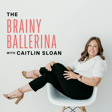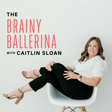
71. Mr. Brainy Ballerina Unplugged: The Partner's POV of the Dance World with my Husband, Steve Sloan
In this week’s podcast episode, I’m joined by my husband, THE Mr. Brainy Ballerina Steve Sloan, to reflect on our journey together - from his background as a college soccer player to supporting my career as a professional dancer, and now navigating life as parents. We share stories from our early days of dating, his first impressions of the ballet world, and the infamous “apple crisp incident” during tech week.
Steve also opens up about the sacrifices we’ve both made for each other’s careers, how his corporate work “selling robots to scientists” compares to the ballet world, and what lessons dancers can teach everyone about resilience and determination.
We also tackle some fun audience questions, including Steve’s hidden talent, his favorite roles he’s seen me perform, and his heartfelt advice for anyone in a relationship with a dancer.
This episode is full of laughter, honesty, and love. Enjoy this behind-the-scenes look at our marriage and the ways ballet has shaped our lives!
Key Points in this Episode:
- Steve’s background as a soccer player and how it connected him to ballet culture
- Our early relationship and the sacrifices we made for each other’s careers
- Steve’s first time seeing me perform (which was also his first time at a ballet ever!)
- Quirky realities of living with a dancer
- How the ballet industry and corporate America could learn from each other
- Reflections on supporting each other’s dreams through marriage and parenthood
Links and Resources:
Get 10% off registration for Étoile Dance Competition with code BRAINY10.
Get your copy of The Ultimate Audition Guide
Let’s connect!
My WEBSITE: thebrainyballerina.com
INSTAGRAM: instagram.com/thebrainyballerina
1-1 CAREER MENTORING: book your complimentary career call
Questions/comments? Email me at caitlin@thebrainyballerina.com

